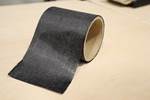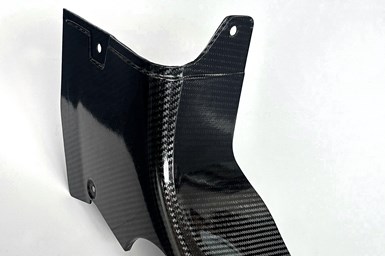Syensqo expands bio-based portfolio with novel MTM epoxy prepreg
Bio-based MTM 49-3 responds to sustainability goals in automotive, containing 30% bio-sourced monomers.
Syensqo (Brussels, Belgium), previously part of Solvay Group, has developed a new version of its flagship MTM 49-3 resin that contains 30% bio-sourced monomers. The product variant complements the portfolio of the company’s MTM prepregs and targets structural automotive applications, including body panels, chassis components and spoilers.
“Our bio-based MTM 49-3 will help OEMs and Tiers to reduce fossil depletion and meet their carbon neutrality goals, while ensuring the same high levels of quality, processability and mechanical performance as its original counterpart,” states Greg Kelly, head of composite product management at Syensqo.
Just like the incumbent material, Syensqo’s novel bio-based MTM 49-3 has a dry glass transition temperature (Tg) of 190°C, and it exhibits enhanced toughness for high impact resistance versus competitive thermoset prepregs. Thanks to its high strength-to-weight ratio, it is reported to yield component mass savings of up to 40% over metals. The product is compatible with autoclave and press-conversion processes and achieves curing at 135°C within 60 minutes. In addition, it has been designed for operator safety, and is free from carcinogens, mutagens or reproductive toxins.
Related Content
-
JEC World 2025 highlights: Evolving recycling and biomaterials technologies
CW technical editor Hannah Mason shares sustainability-focused composites trade show highlights featuring maturation, scale-up, new partnerships, and new technologies in biomaterials and recycling.
-
KCARBON and KIST develop lyocell/PLA/wood biocomposites
Initial demonstration in furniture shows properties two to nine times higher than plywood, OOA molding for uniquely shaped components.
-
NREL develops biomass-derived resin PECAN for wind blades
Demonstration and findings validate PECAN as a method for developing long blades that perform well with composites, outperform some resins and enable chemical recycling.














